Por Hermana María Elena Méndez
¿Dónde estamos? ¿Cuál es el proceso y nuestro trabajo ahora en las parroquias?
Primero, entre ahora y enero la persona encargada de su parroquia, el sacerdote o ministro eclesial laico, nombrará a un equipo lo más representativo posible. Una vez que el equipo esté formado, personal del equipo diocesano para ese fin, entrenarán a este equipo para que sea el encargado de llevar el proceso del V Encuentro en su parroquia. El entrenamiento se hará de la forma más conveniente, ya sea por parroquia, parroquias vecinas o por decanato, según se vea conveniente.
El proceso en las parroquias se llevará a cabo de febrero a junio de 2017 en pequeños grupos usando cinco sesiones basadas en el capítulo 24 de la Exortación del Papa Francisco “Alegría del Evangelio” éstas son: Llamados a un encuentro de amor con Jesús, Con obras y gestos: ¡Atrévete!, Caminando juntos con Jesús, Dando frutos de nueva vida y Festejando la alegría de ser discípulos misioneros. La metodología que usaremos es ver, juzgar, actuar, celebrar y evaluar. Este proceso será también un espacio de evangelización, formación y de espíritu misionero. 
Al teminar las cinco sesiones como parroquia, organizarán un Encuentro parroquial como celebración de la participación en el proceso, tomando en cuenta como material, el resultado que surgió de cada uno de los temas y de los grupos parroquiales.
El equipo parroquial para el V Encuentro será el encargado de recoger el material de los pequeños grupos de reflexión a medida que vayan realizando y haciendo el vaciado. Es importante saber que los pequeños grupos de reflexión pueden ser en familias, en grupos parroquiales, en la catequesis, con los jóvenes, con los adultos, en los trabajos, bilingues, en inglés, español, etc.
Lo único que sí tenemos que garantizar es que tengamos los facilitadores y testigos suficientes para (quien toma notas) cada grupo y unir los resultados junto con los de los otros grupos que vayan surgiendo en las parroquias. Los grupos deben ser pequeños, de cinco a ocho personas para que puedan terminar la reunión en un lapso máximo de dos horas. El equipo nacional mandará los cuadernos para hacer las anotaciones.
Cada parroquia llevará su propio proceso y usando su creatividad a la hora de implementarlo. Estas pueden ser algunas ideas o sugerencias en acuerdo con sus párrocos o ministros eclesiales. Las reflexiones pueden ser durante la cuaresma o la Pascua semanalmente, otros quizá durante un día varios grupos en el mismo lugar, en fin, como cada parroquia se acomode.
Cuando cada parroquia haya llevado el proceso de las cinco sesiones de reflexión y haya celebrado el Encuentro parroquial, el material de consulta en las parroquias nos servirá como material base para la realización de nuestro encuentro hispano diocesano. Este Encuentro tendrá un tinte de trabajo para sacar juntos las conclusiones que deberán ser llevadas por delegados diocesanos a la reunión regional y después al Encuentro nacional en el 2018.
Este proceso es muy importante para nosotros como comunidad, como parroquia y como diócesis porque creará mucho más liderazgo en nuestras comunidades y llegaremos a mucha gente alejada en un espíritu misionero.
Durante el proceso, el equipo diocesano para el V Encuentro y el equipo del ministerio hispano estará apoyando, acompañando y dando respuesta a sus dudas y preguntas. Entremos como parroquia y como diócesis en este proceso con un espíritu abierto, creativo y dejando que Dios nos vaya guiando.
Monthly Archives: November 2016
Preparan taller, peregrinación para los jóvenes
JACKSON – El libro de la Pascual Juvenil del 2017 ya está casi listo y le será entregado a los jóvenes adultos que participaron en su contenido en febrero durante un taller en el cual les explicarán como usarlo y cómo entrenar a los líderes de las diferentes comunidades para que lo utilicen como guía durante la Cuaresma.
Diecisiete jóvenes adultos de Corinth San James; la Catedral de San Pedro, Jackson; New Albany St. James y Tupelo St. James; fueron parte del equipo que se reunió este año en dos oportunidades, una en Raleigh, Carolina del Norte, y en Palm Beach, Florida, para discutir el tema que iban a escoger, el cual fue “Nuestro papel como discípulos misioneros”.
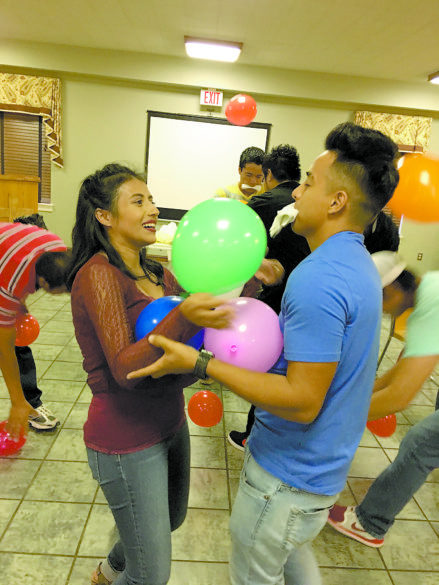
JACKSON – Wilmer Urizar, de la Catedral de San Pedro, y Diana Wox, de la Parroquia Santa Teresa, participan en una dinámica sobre liderazgo durante el convivio juvenil en octubre. El motivo del evento fue para que los jóvenes se conozcan y se hagan amigos. (Foto de Verónica López)
Este es el segundo año en el cual han participado jóvenes de la Diócesis de Jackson. Desde 1980, el Instituto Pastoral del Sureste (SEPI) con su sede en Miami, ha estado coordinado anualmente la preparación y publicación de este libro, en inglés y español, en el cual los jóvenes aplican el misterio pascual a un tema que ellos mismos escogen y que consideran es de importancia y actualidad en sus propias vidas.
El contenido del capitulo de cada una de las seis semanas consta de dinámicas y actividades que se llevan a cabo en el grupo para entender mejor el mensaje sobre el significado del tema, en este caso discipulos misioneros.
El libro utiliza textos de documentos de la iglesia sobre el tema estudiado, testimonios, reflexiones o ideas ofrecidas por los mismos jóvenes para profundizar en el tema. También incluye oraciones, canciones, actividades y proyectos para ser realizadas fuera de la reunión.
Verónica López, asesora de pastoral juvenil hispana de la Diócesis de Jackson, acompañó al grupo durante los dos talleres.
Otra de las actividades dirigidas por López fue un convivio juvenil con jóvenes adultos de la Catedral de San Pedro y la Parroquia Santa Teresa en Jackson en octubre. “Es muy importante que los jóvenes del área compartan actividades juntos para que se conozcan y formen amistades”, dijo López.
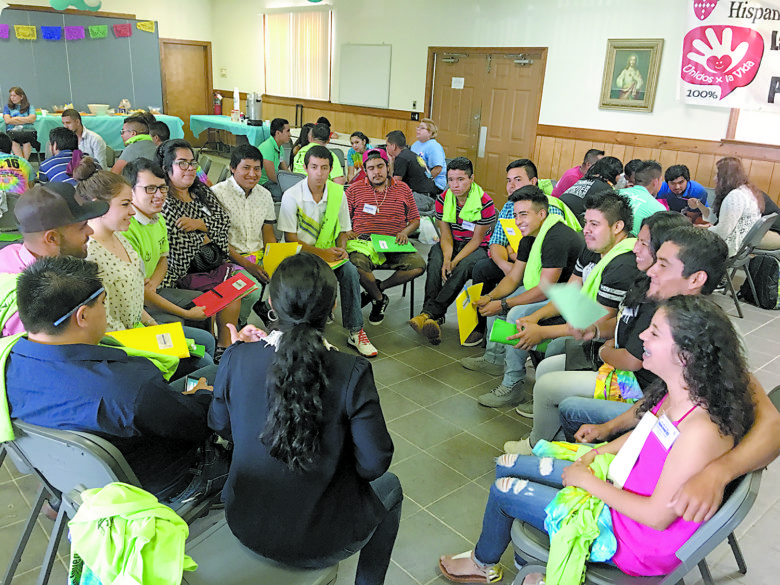
CAROLINA DEL NORTE – Jóvenes adultos del sureste de los Estados Unidos se reunieron recientemente para dialogar sobre el Libro de la Pascua de la Pascual Juvenil del 2017. Izamar Mazi (der.) de Jackson fue una de 17 jóvenes de la Diócesis de Jackson que participó en la redacción del libro.
El convivio incluyó sesiones de escucha, oraciones y dinámicas de comunicación.
López dijo que una de sus prioridades es tratar de que los jóvenes se involucren más en sus parroquias en la pastoral juvenil y colaboren con las actividades que se realicen y tengan la oportunidad de desarrollar su potencial de liderazgo.
López anunció dos eventos que se están preparando para los jovenes adultos: un taller sobre el V Encuentro y la pastoral juvenil hispana el sábado 3 de diciembre en la Parroquia Cristo Rey en Jackson de 11 a 5 p.m. para todos los jóvenes adultos y los adultos interesados en participar o involucrarse en el ministerio de los jóvenes.
Y una peregrinación por la vida y la paz el sábado 14 de enero en Greenwood en el centro de retiro Locus Benedictus. A esta peregrinación están invitados todos los fieles de la diócesis ya que el tema es de gran importancia, el valor de la vida desde la concepción hasta la muerte natural.
También en febrero 2017 se realizará el segundo retiro “Experiencia Cristo” para mayores de 18 años en el Roosevelt State Park en Morton.
Participen con una donación el 29 de noviembre
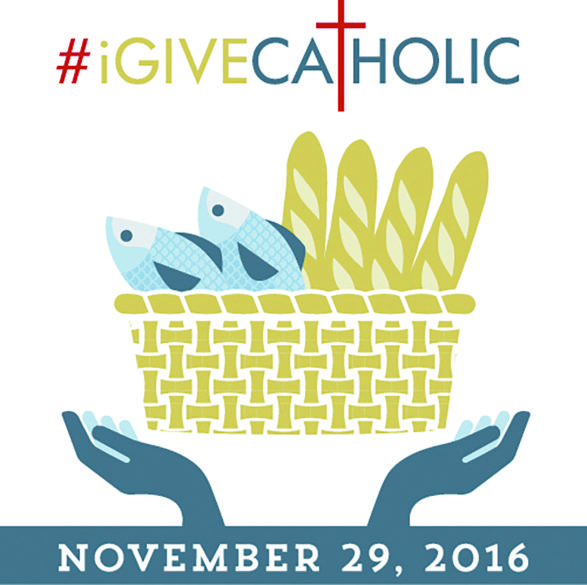 La Diócesis de Jackson está en segundo lugar entre las organizaciones participantes en #iGiveCatholic. En primer lugar está el fundador de este programa, la Arquidiócesis de Nueva Orleáns.
La Diócesis de Jackson está en segundo lugar entre las organizaciones participantes en #iGiveCatholic. En primer lugar está el fundador de este programa, la Arquidiócesis de Nueva Orleáns.
Por primera vez este año, el 29 de noviembre, será un día en el cual la comunidad católica de todo el mundo podrá hacer donaciones en el internet a su(s) organizaciones de preferencia. #iGiveCatholic, Día Mundial de Donación, es un llamado para compartir nuestras bendiciones con la iglesia y los que la iglesia ayuda y apoya en nuestras comunidades.
El equipo detrás de este ‘Martes donante’ pensó que debería haber un día en el cual la gente pueda ofrecer donaciones a sus comunidades durante los días feriados. Ellos crearon un movimiento en el internet alentando a la gente a dar donaciones a sus organizaciones favoritas de caridad durante el martes después del Día de Acción de Gracias y anunciar su donación usando el hashtag #GivingTuesday como una manera de alentar a otros a donar.
Este 29 de noviembre, casi 50 parroquias, escuelas y misiones en la diócesis recibirán donaciones durante 24 horas a través de la página web www.igivecatholic.com. Vea los perfiles de estas organizaciones en sus paginas de internet para averiguar cómo utilizarán el dinero.
La idea se ha expandido de manera que la gente puede ahora honrar su fe con su donación. Varias diócesis han unido fuerzas para crear este año #iGiveCatholic.
Las organizaciones recibirán todo el dinero que les sea donado mientras iGiveCatholic mantendrá la página web y su infraestructura.
Rebecca Harris, directora ejecutiva de la Fundación Católica, recientemente dijo que espera que todos visiten la pagina de facebook de la Diócesis de Jackson y ayuden a correr la voz al publicar su donación.
Oficinas diocesanas y fondos:
Caridades Católicas
La Fundación Católica
Archivos de la Diócesis de Jackson
Oficina del Ministerio de los Negros
Oficina de Educación Católica
Oficina de Vocaciones
Oficina del Ministerio de los Jóvenes
Orden de las Carmelitas Descalzas
Fondo de Retiro de los Sacerdotes
Fondo de Educación para los Seminaristas
Parroquias y misiones
Amory St. Helen Parish
Batesville St. Mary Parish
Bruce St. Luke the Evangelist Parish
Clarksdale Immaculate Conception Parish
Clarksdale St. Elizabeth Parish
Greenville St. Joseph Parish
Greenwood St. Francis Parish
Grenada St. Peter Parish
Hernando Holy Spirit Parish
Holly Springs St. Gregory the Great Parish
Holly Springs St. Joseph Parish
Jackson Cathedral of St. Peter the Apostle
Jackson St. Therese Parish
Leland St. James Parish
Madison St. Francis of Assisi Parish
McComb St. Alphonsus Parish
New Albany St. Francis of Assisi Parish
Olive Branch Queen of Peace Parish
Pearl St. Jude Parish
Pontotoc St. Christopher Mission
Robinsonville Good Shepherd Parish
Sardis St. John Parish
Senatobia St. Gregory
Southaven Christ the King Parish
Tupelo St. James Parish
Vicksburg St. Michael Parish
Colegios:
Clarksdale St. Elizabeth
Columbus Annunciation
Flowood St. Paul Early Learning Center
Greenville Our Lady of Lourdes
Greenville St. Joseph
Greenwood St. Francis of Assisi
Holly Springs Holy Family
Jackson Sister Thea Bowman
Jackson St. Richard
Madison St. Anthony
Madison St. Joseph
Meridian St. Patrick
Natchez Cathedral
Southaven Sacred Heart
Vicksburg Catholic
Líderes laicos y religiosos reaccionan tras triunfo de Trump
Por Catholic News Service
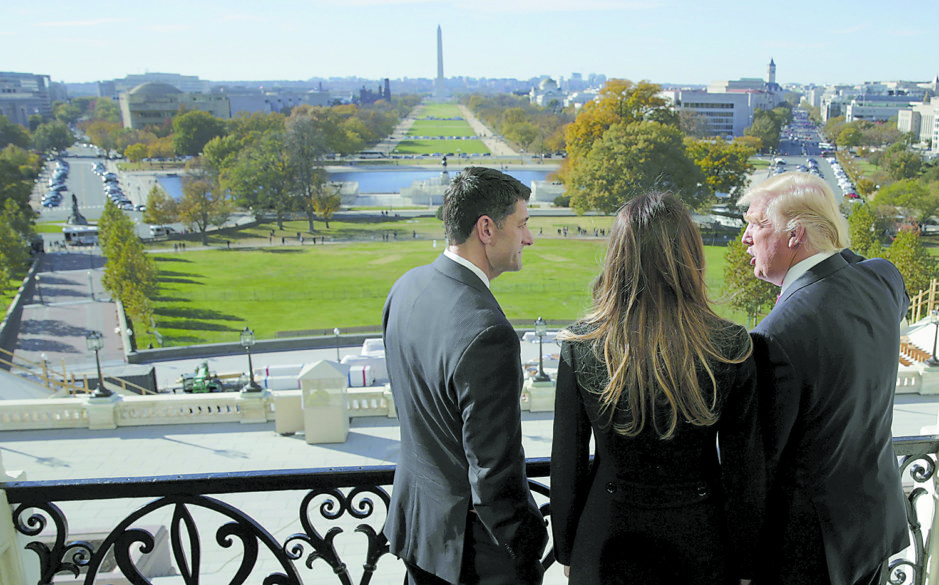
U.S. House Speaker Paul Ryan, R-Wis., shows Melania Trump and U.S. President-elect Donald Trump the Mall from his balcony on Capitol Hill in Washington Nov. 10. (CNS photo/Joshua Roberts, Reuters) See WASHINGTON-LETTER-ELECTION-UNITY Nov. 11, 2016.
WASHINGTON (CNS) — Líderes laicos y religiosos de varias tendencias políticas reaccionaron a las noticias de la inesperada victoria de Donald Trump en la elección presidencial del 8 de noviembre. La mayoría expresó esperanza de que Trump prestaría atención a sus intereses en el futuro, mientras que otros se mostraron decididamente más pesimistas y otros aconsejaron oración.
El arzobispo Joseph Kurtz de Louisville, Kentucky, presidente de la Conferencia de Obispos Católicos de Estados Unidos, subrayó un programa ambicioso en un comunicado de prensa después de las elecciones y felicitó a Trump y a todos los que ganaron durante las elecciones.
La conferencia episcopal espera trabajar con el presidente electo para proteger la vida humana desde su comienzo hasta su final natural, dijo el arzobispo Kurtz. “Vamos a abogar por políticas que ofrezcan oportunidad a todas las personas, de todas las religiones, en todos los ámbitos de la vida”, dijo.
“Nos sentimos firmes en nuestra determinación de que nuestros hermanos y hermanas migrantes y refugiados puedan ser acogidos con humanidad, sin sacrificar nuestra seguridad. Vamos a llamar atención a la persecución violenta que amenaza a nuestros hermanos cristianos y a personas de otras religiones de todo el mundo, especialmente en el Oriente Medio, y vamos a buscar el compromiso de la nueva administración con respecto a la libertad religiosa en el país, garantizando que la gente de fe pueda seguir teniendo libertad para anunciar y dar forma a nuestras vidas alrededor de la verdad sobre el hombre y la mujer, y el vínculo de unión matrimonial que pueden formar”.
Después de que Trump aseguró la mayoría de votos para ganar en el colegio electoral el 9 de noviembre, el cardenal Sean O’Malley de Boston dijo por Twitter, “Felicitaciones al presidente electo Donald Trump. Que Dios le conceda buena salud, sabiduría y valor durante su presidencia”.
Jeanne Mancini, presidente de la Marcha Por la Vida nuncio, “Estamos encantados que los resultados de la elección de esta noche reflejan el consenso pro-vida en los Estados Unidos, en la cámara, el senado y la presidencia. Aplaudimos a los candidatos que tomaron una posición sobre la cuestión más crucial de derechos humanos hoy en día, el aborto”.
Samuel Rodríguez, presidente de la Conferencia Nacional de Líderes Hispanos Cristianos, dijo que hay que continuar luchando para reconciliar el mensaje de justicia del reverendo Billy Graham con el de Martin Luther King, de marchar por la justicia. “Ahora que la elección presidencial está finalmente detrás de nosotros, nuestra nación debe poner la política partidista y la retórica divisiva detrás de nosotros también. En lugar de la agenda del burro o el elefante, los cristianos deben enfocarse en la agenda del Cordero”, añadió Rodríguez.
“Nos hemos comprometido a dialogar con los que piensan diferente y trataremos de hablar con el president electo Trump”, dijo en un comunicado Scott Reed, director ejecutivo de la red nacional de PICO, fundada por un sacerdote de California. “Pero el presidente electo debe ser advertido de que nuestra fe no nos va a permitir dejarlo que cumpla su promesa de criminalizar a los inmigrantes, realizando deportaciones masivas o quedarnos con lo brazos cruzados al ver la discriminación contra afroamericanos, latinos y minorías religiosas”.
John Gehring, director del programa católico Faith in Public Life dijo que le cuesta encontrar las palabras para procesar el hecho de que un hombre peleón, que prometió prohibirle la entrada al país a musulmanes, que está orgulloso del asalto sexual que cometió en el pasado, y que demoniza a inmigrantes, y quien insultó al Papa Francisco, fuese elegido presidente.
“Como cristiano y padre de niños pequeños, estoy angustiado”, dijo Gehring. “Pero como cristiano, también estoy comprometido a caminar el camino difícil de la fe y la esperanza. Dijo que no entiende a los católicos que apoyaron a Trump, “pero hay demasiado que arriesgar para no buscar terreno común y el bien común”.
Laura Barrett, directora ejecutiva de Interfaith Worker Justice dijo en un comunicado, “Hoy es un día oscuro en la historia de Estados Unidos”. Un hombre que construyó una campaña para llegar a la Casa Blanca con racismo, xenofobia, machismo, ahora se va a convertir en el líder más poderoso del mundo, dijo Barrett.
Kristan Hawkins, presidente de Students for Life of America, dijo en un comunicado que Trump hizo muchas promesas a los que apoyan al movimiento pro-vida a lo largo de su campaña. “La generación pro-vida asegurará de que mantenga esas promesas como presidente”.
Column: Complete the Circle: Thanksgiving
By George Evans
What is it that makes Thanksgiving special? Answers abound. Some say it’s the food. Argue the superiority of mom’s dressing over all other comers. Cornbread vs white bread or cornbread vs. mixed. How about pumpkin pie vs. ambrosia for dessert or mashed potatoes vs. sweet potato casserole or green beans vs. spinach madeleine? No debate on turkey. Just how much. Do some birds lose some taste if they are too big? The controversy can go on and on. But everyone always is stuffed at the end of the meal.
Politics is usually a disaster and should be avoided as a topic of discussion. This year more so, even if the election is over. Football has been a mixed bag this year so best to move on. Family problems have been relatively minor so probably they deserve only a passing mention. If something serious needs discussing that should probably wait for a smaller group at a later time not a holiday.
Religion can be explosive depending on the circumstances. But shouldn’t God have a place in Thanksgiving even if religion as such is soft peddled? After all, none of us can celebrate getting along with the Native Americans anymore. We have solved that situation by moving them “out of the way” to reservations. White folks get along with blacks, Hispanics, Asians, Muslims and others better than ever and vice versa. Just witness the recent campaigns for president. That must mean God has blessed us and our land.
It’s Thanksgiving so we must thank God for all our blessings. Scripture tells us over and over to thank God for life, particularly since we are all created in his own image and likeness. Apparently we must think we thank and honor Him by our abortion rate, our wars, our executions, our murders, our educational failures, our sexual abuses and other indiscretions. We do sometimes thank Him by acts of kindness and compassion, by selflessness instead of selfishness and narcissism, by generosity rather than greed, by inclusion rather than exclusion, by hope rather than despair and by love rather than hate, all of which his Son suggests to us over and over in the New Testament.
We also thank God at Thanksgiving for the wonderful creation he has given us for our use, joy and stewardship. We pledge to keep it pristine, develop it carefully and keep it awe-inspiring for those who come after us. We thank God at Thanksgiving for our wonderful parents and grandparents, spouses, children and grand children, friends and all who have loved us and we them in sharing our hearts and souls with each other. We thank God for being a God who talks to us, who embraces us, who shares with us when we embrace him in prayer and action.
We thank God for the grace to ask forgiveness from those we may be closest to and whom we may have hurt the worse and to forgive them and others 70 times seven times as part of a deeper maturity and conversion. We thank Him finally and primarily for the gift of His Son, Jesus, who loves us unconditionally, who has redeemed us and saved us from our sin, who makes our resurrection part of His and who by grace makes our Thanksgiving special.
Now, we can all fully join in this Thanksgiving regardless of what may be served for dinner. Happy Thanksgiving.
(George Evans is a retired pastoral minister and member of Jackson St. Richard Parish.)
Column: Word on Fire: Pilgrim teaches lesson of real loss
By Bishop Robert Barron
I’m in the process of re-reading a spiritual classic from the Russian Orthodox tradition: The Way of a Pilgrim. This little text, whose author is unknown to us, concerns a man from mid-nineteenth century Russia who found himself deeply puzzled by St. Paul’s comment in first Thessalonians that we should “pray unceasingly.” How, he wondered, amidst all of the demands of life, is this even possible? How could the Apostle command something so patently absurd?
His botheration led him, finally, to a monastery and a conversation with an elderly spiritual teacher who revealed the secret. He taught the man the simple prayer that stands at the heart of the Eastern Christian mystical tradition, the so-called “Jesus prayer.” “As you breathe in,” he told him, say, ‘Lord Jesus Christ,’ and as you breathe out, say, ‘Have mercy on me.’” When the searcher looked at him with some puzzlement, the elder instructed him to go back to his room and pray these words a thousand times. When the younger man returned and announced his successful completion of the task, he was told, “Now go pray it 10 thousand times!”
This was the manner in which the spiritual master was placing this prayer on the student’s lips so that it might enter his heart and into the rhythm of his breathing in and out, and finally become so second nature to him that he was, consciously or unconsciously, praying it all the time, indeed praying just as St. Paul had instructed the Thessalonians.
In the power of the Spirit, the young man then set out to wander through the Russian forests and plains, the Jesus prayer perpetually on his lips. The only object of value that he had in his rucksack was the Bible, and with the last two rubles in his possession, he purchased a beat-up copy of the Philokalia, a collection of prayers and sayings from the Eastern Orthodox tradition. Sleeping outdoors, fending largely for himself, relying occasionally on the kindness of strangers, reading his books and praying his prayer, he made his way.
One day, two deserters from the Russian army accosted him on the road, beat him unconscious and stole his two treasures. When he came around and discovered his loss, the man was devastated and wept openly: how could he go on without food for his soul? Through a fortuitous set of circumstances, he managed to recover his lost possessions, and when he had them once again, he hugged them to his chest, gripping them so hard that his fingers practically locked in place around them.
I would invite you to stay with that image for a moment. We see a man with no wealth, no power, no influence in society, no fame to speak of, practically no physical possessions — but clinging with all of his might and with fierce protectiveness to two things whose sole purpose is to feed his soul. Here’s my question for you: What would you cling to in such a way? What precisely is it, the loss of which would produce in you a kind of panic? What would make you cry, once you realized that you no longer had it?
And to make the questions more pointed, let’s assume that you were on a desert island or that you, like the Russian pilgrim, had no resources to go out and buy a replacement. Would it be your car? Your home? Your golf clubs? Your computer? To be honest, I think for me it might be my iPhone. If suddenly I lost my ability to make a call, my contacts, my music, my GPS, my maps, my email, etc., I would panic — and I would probably cry for sheer joy once I had the phone back, and my fingers would close around it like a claw. What makes this confession more than a little troubling is that, 10 years ago, I didn’t even own a cell phone. I lived my life perfectly well without it, and if you had told me then that I would never have one, it wouldn’t have bothered me a bit.
What I particularly love about the pilgrim is that he was preoccupied, not about any of the passing, evanescent goods of the world, but rather about prayer, about a sustained contact with the eternal God. He didn’t care about the things that obsess most of us most of the time: money, power, fame, success. And the only possessions that concerned him were those simple books that fed his relationship to God. Or to turn it around, he wasn’t frightened by the loss of any finite good; but he was frightened to death at the prospect of losing his contact with the living God.
So what would you cling to like a desperate animal? What loss would you fear? What do you ultimately love?
(Bishop Robert Barron is an auxiliary bishop of the Archdiocese of Los Angeles and the founder of Word on Fire Catholic Ministries.)
Post-election work for Catholics: reconciliation, healing.
By Carol Zimmermann Catholic News Service
WASHINGTON (CNS) — All the distrust, vitriol and rancor stirred up during the 2016 presidential election campaign did not go away when votes were tallied.
The Nov. 8 election’s outcome, for many, only added more layers of frustration, anger and fear, prompting dozens of protests across the country.
Political leaders, including Hillary Clinton, President-elect Donald Trump and President Barack Obama, acknowledged the disunity and urged people after the election to try to work together.
Catholic leaders have been making similar pleas, not only for the nation, but also recognizing the division that exists among the church’s own members who split their vote

U.S. House Speaker Paul Ryan, R-Wis., shows Melania Trump and U.S. President-elect Donald Trump the Mall from his balcony on Capitol Hill in Washington Nov. 10. (CNS photo/Joshua Roberts, Reuters) See WASHINGTON-LETTER-ELECTION-UNITY Nov. 11, 2016.
— 45 percent for Clinton and 52 percent for Trump.
Four days before the election, Supreme Knight Carl Anderson, CEO of the Knights of Columbus, told a Catholic group in Arlington, Virginia, that regardless of the election’s outcome, “our country will remain deeply divided and those divisions are, to a very real extent, also reflected within our own Catholic faith community.”
The question before Catholics, he said, is whether we will be “a source of unity and reconciliation, or whether we will be a cause of further division.”
That view also was expressed in a Nov. 9 editorial in the National Catholic Reporter newspaper describing the political climate as a “profound moment in our nation’s history and in our church’s history. … The question now is whether we have the courage and leadership to confront these hurts, work for justice and begin the healing process.”
Putting it even more succinctly was an Election Day tweet by Cardinal-designate Joseph W. Tobin of Indianapolis: “Whatever happens at the polls, God will reign. Our work begins tomorrow, building bridges and healing wounds.”
Archbishop Joseph E. Kurtz of Louisville, Kentucky, and president of the U.S. Conference of Catholic Bishops, said: “Every election brings a new beginning. Some may wonder whether the country can reconcile, work together and fulfill the promise of a more perfect union. Through the hope Christ offers, I believe God will give us the strength to heal and unite.”
And Sister Simone Campbell, executive director of the Catholic social justice lobbying organization Network, said her faith dictates that “now, more than ever, we need to mend the gaps and bridge the divides among us.”
“If anger fueled the election, we need to listen deeply to this reality, not dismiss it,” said the Sister of Social Service. “The temptation is to immediately think about how we will fight back, but fighting back will only reinforce this mess we’re in. Instead, we have to fight for a vision that eases people’s fears, brings us together and solves problems.”
Days before the election, Jesuit Father Jim Martin, author and editor at large at America, a weekly magazine published by the Jesuits, said after the election Catholics might want to say the “Prayer for Christian Unity,” which is meant for interfaith unity but has an apt message at a time when many “will feel excluded and unwelcome.”
It turns out the Catholic “Prayer for After an Election” also highlights unity, asking God to “heal us from our differences and unite us, O Lord, with a common purpose, dedication and commitment to achieve liberty and justice in the years ahead.”
The very notion of unity after a more contentious presidential campaign than most can remember might seem far-fetched but some Catholics stress it should at least start at the parish level.
Father Thomas Berg, vice rector and professor of moral theology at St Joseph’s Seminary in Yonkers, New York, said the differences of opinion revealed in this election “should never be allowed to become occasions of separation and rupture. Disagreement is an invitation to encounter, dialogue and to witness to the faith we presumably share.”
“Postelection, at the parish level, how wonderful it would be if we could engage each other dispassionately in calm rational dialogue about our differences with regard to the candidates,” said the priest, who is currently writing a book, “Hurting in the Church: A Way Forward for Wounded Catholics.”
Zach Flanagin, a professor of theology and religious studies at St. Mary’s College of California in Moraga, similarly suggested old-fashioned dialogue saying Catholics should take their cue from Pope Francis who has spent a good part of his pontificate accompanying people and listening to them.
“It’s incumbent at a time like this when there is so much division that we sit down and listen to people,” he told CNS on Election Day.
One way for this to happen in parishes — which he said “can be as divided as communities” — would be in for parishes to host dinners where parishioners have the chance to talk to each other about what matters to them. They might not agree with each other, he said, but they will likely come away respecting the other person.
Flanagin said he has seen programs like this work in high schools and junior high schools that have recognized the need to bring diverse communities together to help heal toxic environments.
Sherry Weddell, co-founder of the Catherine of Siena Institute, a group based in Colorado Springs, Colorado dedicated to strengthening parishes and lay Catholics, said the big post election question is: “How can we help rebuild our relationships with one another now that the shouting is over?”
For Catholics, she said the answer is found in embracing the church’s mission in outreach to others. “Being apostles together slowly builds remarkably strong bridges of trust and hope over the divides that separate us,” she said, adding that doing this “can actually heal and transform us as well.”
And for many, part of the mission is simply to keep up the work at hand and encourage others not to lose hope.
Peggy Lewis, interim dean of business and graduate studies at Trinity Washington University in Washington, said she advises students who are disheartened by the election, especially immigrants covered by the Obama administration’s Deferred Action for Childhood Arrivals program, or DACA, that the “fight is still on.”
Lewis, highlighted with Trinity students in a Nov. 9 Chronicle of Higher Education news video, said she has been urging these students not to give up.
“Getting students from anger, where I still am, to thinking about the future, is something we’re striving to do,” she said.
Los Angeles Archbishop Jose H. Gomez, during a Nov. 10 interfaith prayer service for peace, solidarity and unity at the Cathedral of Our Lady of the Angels, offered similar encouragement to the immigrant community after the election.
“Tonight in America, children are afraid. Men and women are worried and anxious, thinking about where they can run and hide,” he said.
“The answer is not angry words or violence in the streets. It never solves anything. It only inflames it more. We need to be people of peace, people of compassion. Love not hate. Mercy not revenge,” he said. “These are the tools to rebuild our nation and renew the American dream. Tonight we promise our brothers and sisters who are undocumented: We will never you leave you alone.”
– – –
Follow Zimmermann on Twitter @carolmaczim.
Retired Religious Collection Dec. 10-11
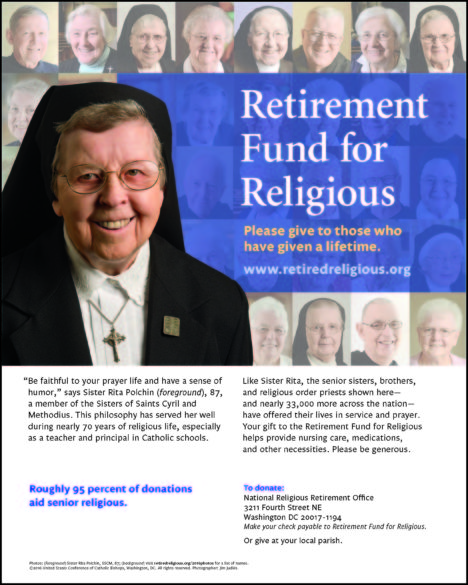
Greenville School unified, blessed
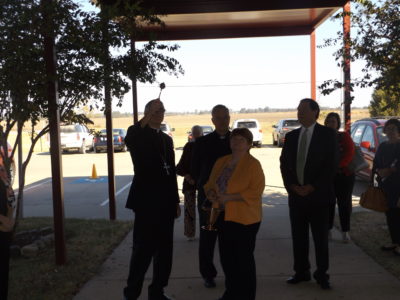
Bishop Joseph Kopacz, left, blesses the new entryway into Greenville St. Joseph and Our Lady of Lourdes school, assisted by Catherine Cook, superintendent of Catholic Schools, and Father Bill Henry, pastor in Greenville.
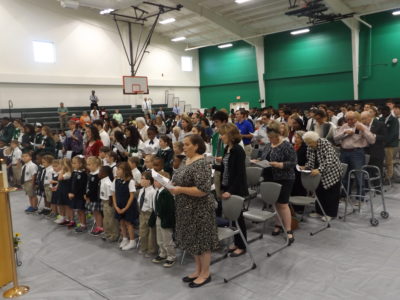
Before each room was blessed, the entire school community gathered for a Mass in the gym. Capital Campaign Chairman Britt Virden told the crowd that the new structure represented a $10 million investment in the community. The schools have been on separate campuses since 1964. St. Joseph High School has been on the VFW Road campus for more than 10 years. (Photos by Missi Blackstock)
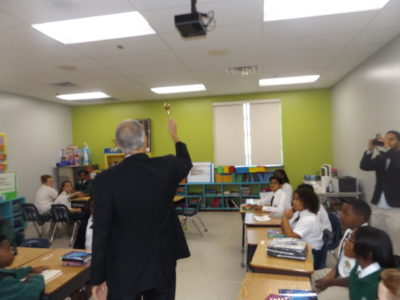
GREENVILLE – Bishop Joseph Kopacz, center, blessed the first graders and their classroom as part of blessing the new facility at St. Joseph School on Thursday, Oct. 27. The blessing was the final chapter in a years-long effort to get St. Joseph High and Our Lady of Lourdes Elementary schools on the same campus. Elementary students use 11 classrooms, nine more are for middle and high school students. The facility also has two science labs, a computer and business lab, resource, art and music rooms, a media/library center, chapel and gymnasium.
Teens seek vocations through SEARCH retreat
By Abbey Schuhmann
High school juniors and seniors from across the Diocese of Jackson gathered at Camp Wesley Pines near Hazlehurst Nov. 11-13 for the fall diocesan SEARCH Retreat. SEARCH is a Catholic youth retreat that models the Cursillo retreat for adults but designed for youth in grades 11th-12th who have a strong desire to deepen their faith and relationship with Christ.
A retreat “for teens, led by teens,” SEARCH is an experience like none other with a strong focus on vocations. It engages youth in a special way and calls them to live out their Catholic faith in a bold, real, active and healthy way.
SEARCH first started in this diocese in the 1970s but interest in it declined in the 1980s. In 2003, Father Mike O’Brien and Father Frank Cosgrove approached Jackson St. Richard parishioners Ann and Jeff Cook and encouraged them to re-introduce the SEARCH retreat to the diocese.
Having lived in Austin, Texas, and participated with multiple SEARCH retreats there, the Cooks coordinated bringing in a team from Austin to lead the first SEARCH retreat in nearly 20 years for our Diocese in January 2004. The first youth staff from the diocese led the next SEARCH retreat under the leadership from volunteers, Ann and Jeff Cook in May of 2004.
During the past 13 years, the diocese has held more than 25 SEARCH retreats under the leadership of the Cooks.
Much of what happens in the retreat is kept a mystery but a few things are certain – you will have fun, you will be challenged to grow in your faith and chances are you will make a few new friends.
The retreat team is primarily made up of a youth staff from teens who have previously attended a SEARCH retreat. Once a teen attends a SEARCH retreat weekend, he or she has the opportunity to apply to staff future retreats.
The adults who are present throughout the weekend serve “behind the scenes.” It is the teens who lead this retreat. The SEARCH model really gives our youth the opportunity to demonstrate and carry out servant leadership. This retreat would not be possible without the help of adult volunteers who have served in this ministry for so many years.
We are especially grateful to Ann and Jeff Cook for continuing to serve as the volunteer, adult SEARCH coordinators. Without their dedicated service, this ministry would not be where it is today.
The SEARCH ministry is alive and well in the diocese and the SEARCH family continues to grow through each retreat.
The Office of Youth Ministry is currently looking at dates in 2017 for future SEARCH retreats. We are always looking for adults who are open to serving in the SEARCH ministry. If you are interested, contact Abbey Schuhmann, coordinator for the Office of Youth Ministry, abbey.schuhmann@jacksondiocese.org, 601-949-6934.
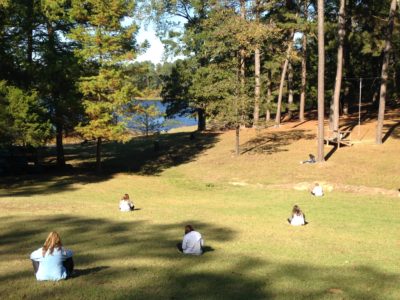
Teens on SEARCH retreat take time for prayer outside. (Photos by Abbey Schuhmann)
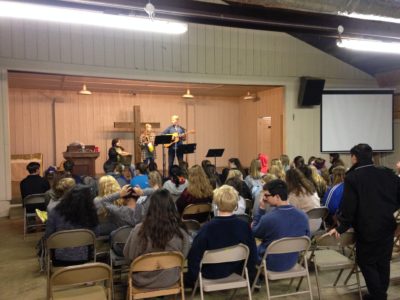
Young people on the Search retreat spend time at liturgies such as this one. Tim Cook and Ellie Smith led music during the retreat.
